2022-2023
ATOPOS cvc launches the residency of the independent curator Eleni Riga in the framework of #OccupyAtopos, invited by Vassilis Zidianakis, the artistic director of the organization. Looking ahead to the program of 2023 Riga creates a new curatorial model, the Office of Hydrocommons (#TheOfficeOfHydrocommons) so as to facilitate the research on new aesthetic approaches of ecofeminism with emphasis on water commons (hydrocommons). Ecofeminism is a complex social and academic movement that in its most inclusive form creates links between ecology and social justice. During her residency the curator will focus on Françoise d’Eaubonne, pioneer author of ecofeminism, on Lois Gibbs, environmental activist and Astrida Neimanis, theorist of hydrofeminism.
Eleni Riga is an independent curator and cultural producer. Her practice focuses on the intersection of ecology and feminism, and politics of care. She has collaborated as an assistant curator at the art center Friart in Switzerland, and worked as a curatorial assistant at documenta 14 in Athens and in Kassel. She has directed the Contemporary Art Department of Eleusis 2023 – European Capital of Culture. Also, she has worked in the Education Department of the Museum of Modern Art in New York, and Palais de Tokyo in Paris. As an independent curator, she has collaborated with many art organizations in Europe. She has participated in the Research Residency Program 2022 of the G. & A. Mamidakis Foundation in Aghios Nikolaos, Crete, the Tailor-Made Fellowships of Onassis AiR in Athens, the art residency GENERATOR of the art center 40mcube in Rennes, and ARCAthens, in Bronx, New York. Riga studied Communication, Media and Culture at Panteion University in Αthens, and holds master degrees in curatorial studies from Paris 1 Panthéon–Sorbonne, and Konstfack University of Arts, Crafts and Design in Stockholm.
#OccupyAtopos is the artist residency programme of ATOPOS cvc. The main focus of the program is on interdisciplinary research and the study of contemporary visual culture of the human body. It will emphasize the embodied experience and the narrated character of the gendered and racialized body, personal and collective trauma, memory, systems of embodied cognition, as well as the relationship between the body, social justice, and ecology. Its mission is to observe and support the creative process of emerging artists, designers, curators and thinkers.
See also:
- 2010 - 2023 #OccupyAtopos

